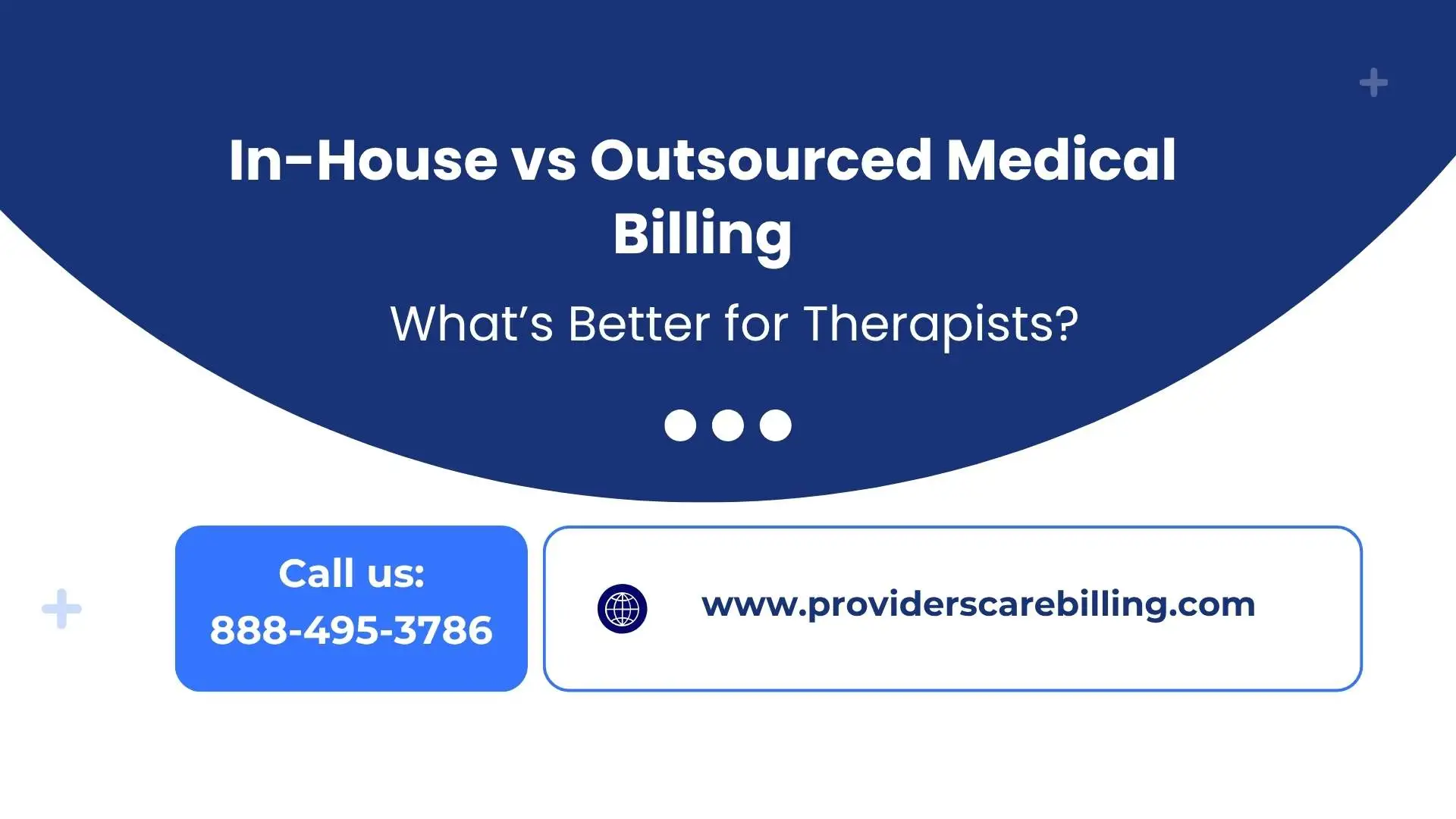Did you know that almost 70 percent of small therapy practices in the United States are losing thousands of dollars annually due to billing mistakes, payment denials, and delayed payments?
In-House vs Outsourced Medical Billing has become one of the most important and time-consuming assignments in the operation of a therapy practice. Regardless of whether you operate a small behavioral health clinic or a developing group practice, your revenue cycle effectiveness depends on submitting claims correctly, posting payments, and making follow-ups. This is the great question here, though: should you do billing yourself or pay a professional medical billing company to do it?
We are going to discuss the difference, advantage, and cost-effectiveness of in-house and outsourced medical billing and demonstrate how outsourcing can help therapists to spend more time with their clients and less time on administrative burdens.
What Does In-House Medical Billing Mean?
In-house medical billing refers to the situation in which all your clinic or therapy practice does in terms of billing. This involves submissions of claims, follow-ups, invoicing patients, posting payments, and reconciliation, which is done by your own staff using your selected billing software.
The benefits of In-House Billing:
- Total Control– You retain all the controls on coding accuracy in order to claim tracking.
- Direct Communication– Therapists are able to organize efficiently with the billing staff to clarify patient or payer questions regarding the billing process.
- Fluid EHR Integration– Billing occurs in the same platform, and it is simpler to coordinate with your EHR or practice administration system.
Downsides of In-House Billing:
- Expensive to Operate– Salaries, benefits, training, and software subscriptions mount up. One full-time biller may be in excess of 45,000 a year, without turnover or upgrade, which raises questions about the pros and cons of in-house billing.
- Human Error Risk– It involves failure to meet claims or compliance, even with slight errors in claims, without certified coders.
- Scalability: Minimal to Naughty Scalability– With an increase in patient volume, there is an increase in administrative work. Hiring personnel will entail increased costs and time to onboard.
There is a family therapist in Chicago who began with 1 in-house biller, who processes the claims of 50 clients every week. As she increased her practice to three therapists, three times more she was denied, and half the amount was paid. This could not be sustained by the in-house team, and she resorted to the outsourcing option to restore efficiency.
How Outsourcing Medical Billing will help save time and money
Outsourced medical billing services involve the use of external companies that will handle submission of claims, coding, follow-ups, and reimbursements on behalf of. These companies hire quality, qualified coders to understand the payer policies, compliance legislation, and optimization of claims.
1. Cost Efficiency
- Your collections are only paid a percentage of your collections, typically 2.9 to 5 percent, based on specialty and volume.
- Removes the cost of employment, training, payroll, and software maintenance.
- 20-30 percent of the therapy practice is saved every year compared to an internal arrangement.
2. Higher Claim Accuracy
- HIPAA-compliant billing makes use of current CPT and ICD-10 codes, ensuring adherence to regulations in the billing process.
- Qualified specialists are aware of the payer-related peculiarities.
- A reduction in the number of denials, quicker reimbursements, and enhancement of compliance.
3. Streamlined Workflow
- An outsourced partner deals with:
- Verification of eligibility and benefits.
- Tracking and submitting claims.
- Denial management and appeals.
- Recording and reconciliation of payments.
- Monthly revenue-cycle reports.
By outsourcing these functions, therapists will be able to concentrate on the care of the clients.
4. Scalability and Compliance
- Outsourced billing is easily scaled with the growth of your practice.
- Partners hire without recruitment.
- As one of the leading services, HIPAA and payer compliance will protect patient information in all its stages.
In-House vs Outsourced Medical Billing: Major Comparison
| Factor | In-House Billing | Outsourced Billing |
| Cost | Usually Higher (salaries of staff, software, benefits) | Usually Lower (percentage of collections) |
| Control | Total internal control | Managed by experts |
| Accuracy | Depends on staff proficiency | Expert coders guarantee accuracy. |
| Scalability | Usually limited | Scalable for growth |
| Time Investment | High | Minimal |
| Compliance | Dependant on Staff | Ensured by a professional partner |
Why Therapists Prefer Outsourced Billing Services
Therapists across the U.S., from behavioral health specialists to physical and occupational therapists, are increasingly turning to outsourced billing services to improve their billing process and overall efficiency. Here’s why:
- Reduced Claim Denials- Professional billers ensure clean claims on the first submission.
- Faster Reimbursements- Expert follow-ups and appeals reduce revenue cycle delays.
- Decreased Administrative Burden- The therapists will have time to spend on patient care and clinical documentation.
- Enhanced Financial disclosure- Consistent performance reports and age reports facilitate the monitoring of cash flow easily.
- Stress‑Free Compliance- Billed teams that are outsourced are up-to-date with HIPAA, CPT, and CMS requirements- reducing audit risks.
The Pros of Outsourcing Medical Billing
- Time Savings- No longer running after unpaid claims or EOBs.
- Reduced Overhead- Do away with expenses on in-house billers, training, and software renewals.
- Accuracy & Compliance- Advanced claim scrubbing tools are used by certified coders to avoid denials.
- Better Cash Flow- On-time reimbursements guarantee regular revenue among therapists.
- Availability of high-tech Technology- AI-based analytics and automation in the outsourced billing companies to optimize claim submissions.
- Data Security- All claims are handled using HIPAA-compliant services in billing, which guarantees the complete security of patient information.
Conclusion
The decision of whether to choose In-House vs Outsourced Medical Billing depends on what you want to accomplish with your practice. In-house billing can be a good solution if you prefer full control and have the resources to employ staff. However, when it comes to efficiency, accuracy, and cost savings, outsourcing often provides a stronger advantage—especially for busy therapists managing an increasing caseload.
Collaborating with a reliable medical billing provider like Providers Care Billing LLC can transform how your practice operates. It ensures smooth cash flow, fewer denials, and a stress-free billing process. When you’re ready to simplify your workflow, increase collections, and focus more on patient care, choose the billing solution that best fits your therapy practice.
CTA
Want to make your billing process easy and expand your therapy practice? Collaborate with a medical billing firm specializing in therapy billing services and offering HIPAA-compliant services.
Call us now and find out how we will simplify your revenue cycle and increase reimbursements!
📞 Call Now: 888-495-3786
📧 Email: Info@providerscarebilling.com
FAQs
1. How expensive is outsourced medical billing?
The average medical billing outsourced services cost 2.9 -5 percent of monthly collections, depending on your medical specialty and volume of claims.
2. What is the cost reduction that outsourcing helps in?
It saves on employee costs, employee training, and software- you pay a small percentage when there are claims that are gathered.
3. In which case is more profitable, in-house or outsourced billing services?
Outsourcing increases the profits of most therapy practices as they receive fewer denials as well as quicker payment, and reduced overhead.
4. What is the golden rule of medical billing?
The most practical way to reduce denials and get maximum claims is always to provide correct information in a claim.





